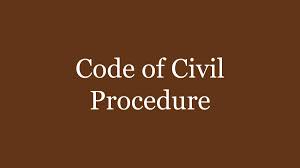Section 38 of CPC states that a decree may be executed by the court which passed it, or by the court to which it is transferred for execution.
Transfer of decrees for execution
A decree may be transferred for execution to another court for a number of reasons, including:
- The convenience of the parties.
- The availability of assets to be attached.
- The presence of the defendant.
To transfer a decree for execution, the plaintiff must apply to the court which passed the decree. The court will then consider the reasons for the transfer and, if satisfied, will issue a transfer order.
Execution of decrees by transferred courts
Once a decree has been transferred for execution, the transferred court will have the same powers to execute the decree as the court which passed the decree. This means that the transferred court can issue warrants of execution, attach property, and arrest the defendant.
Other provisions relating to execution of decrees
The CPC also contains a number of other provisions relating to the execution of decrees, such as:
- The limitation period for execution of decrees.
- The procedure for attachment and sale of property.
- The procedure for arrest and detention of the defendant.
- The procedure for release of the defendant from arrest.
Section 38 of CPC is an important provision that ensures that decrees passed by courts can be effectively executed. By allowing decrees to be transferred to other courts for execution, Section 38 helps to ensure that the rights of litigants are protected, even if the defendant does not reside in the same jurisdiction as the court which passed the decree.
Case laws on Section 38 of CPC
Commissioner of Income Tax v. N.C. Jain (AIR 1984 SC 609)
In this case, the Supreme Court held that a decree can be transferred for execution to a court in another state, even if the defendant does not reside in that state.
The facts of the case were as follows:
- The Commissioner of Income Tax (the plaintiff) obtained a decree against the defendant for the payment of income tax.
- The defendant resided in Delhi, but the plaintiff applied to the court in Mumbai to transfer the decree for execution to Mumbai.
- The court in Mumbai refused to transfer the decree on the ground that the defendant did not reside in Mumbai.
- The plaintiff appealed to the Supreme Court.
The Supreme Court held that the court in Mumbai had erred in refusing to transfer the decree. The Court held that Section 38 of the CPC allows a decree to be transferred for execution to a court in another state, even if the defendant does not reside in that state. The Court further held that the convenience of the parties is a relevant factor to be considered when deciding whether or not to transfer a decree.
Smt. Kusum Rani v. Smt. Shakuntala Devi (AIR 1997 SC 2343)
In this case, the Supreme Court held that a decree can be transferred for execution to a court in another state, even if the decree has been appealed.
The facts of the case were as follows:
- Smt. Kusum Rani (the plaintiff) obtained a decree against Smt. Shakuntala Devi (the defendant) in a family court in Delhi.
- The defendant appealed the decree to the high court in Delhi.
- While the appeal was pending, the plaintiff applied to the family court to transfer the decree for execution to a family court in Mumbai.
- The defendant objected to the transfer, arguing that the decree could not be transferred while an appeal was pending.
- The family court transferred the decree to Mumbai.
- The defendant appealed the transfer order to the Supreme Court.
The Supreme Court held that the family court had not erred in transferring the decree. The Court held that Section 38 of the CPC allows a decree to be transferred for execution to a court in another state, even if an appeal is pending against the decree.
Union of India v. Ashok Kumar (AIR 1992 SC 1217)
In this case, the Supreme Court held that a court cannot refuse to transfer a decree for execution on the ground that the decree is unenforceable in the state to which it is being transferred.
The facts of the case were as follows:
- The Union of India (the plaintiff) obtained a decree against Ashok Kumar (the defendant) in a court in Delhi.
- The defendant resided in Uttar Pradesh.
- The plaintiff applied to the court in Delhi to transfer the decree for execution to a court in Uttar Pradesh.
- The defendant objected to the transfer, arguing that the decree was unenforceable in Uttar Pradesh because the defendant did not have any assets in that state.
- The court in Delhi refused to transfer the decree on the ground that it was unenforceable in Uttar Pradesh.
- The plaintiff appealed to the Supreme Court.
The Supreme Court held that the court in Delhi had erred in refusing to transfer the decree. The Court held that Section 38 of CPC does not allow a court to refuse to transfer a decree on the ground that it is unenforceable in the state to which it is being transferred. The Court further held that it is up to the court in the state to which the decree is transferred to decide whether or not to execute the decree.
Conclusion Section 38 of CPC
The case laws cited above illustrate the wide scope of Section 38 of CPC. Section 38 of CPC ensures that decrees passed by courts can be effectively executed, even if the defendant does not reside in the same jurisdiction as the court which passed the decree. This provision is important for protecting the rights of litigants and ensuring the smooth functioning of the judicial system.

